

I will definitely read every round of Gitcoin review written by Vitalik, where I can quickly browse the directions, projects or communities that are enthusiastically followed by the Ethereum community, as well as Vitalik's comments on these.
The seventh round of Gitcoin Grants is over! This round of matching funds and donation funds have seen unprecedented growth, matching donations of US$274,830 and matching funds of US$450,000 in 857 projects.
The category structure has changed again; this time it is divided between "dapp technology", "infrastructure technology" and "community". The results are as follows:
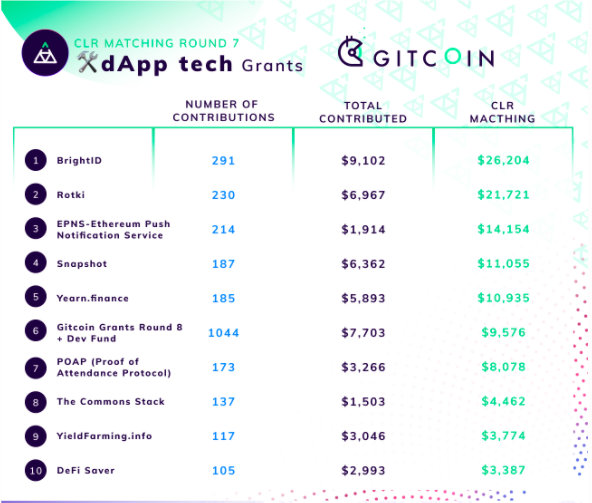
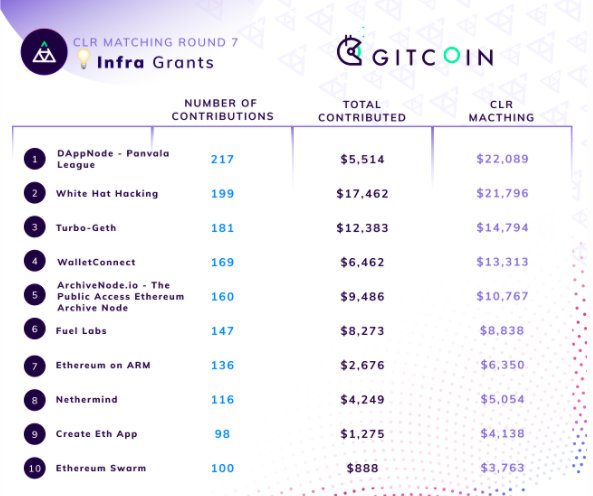
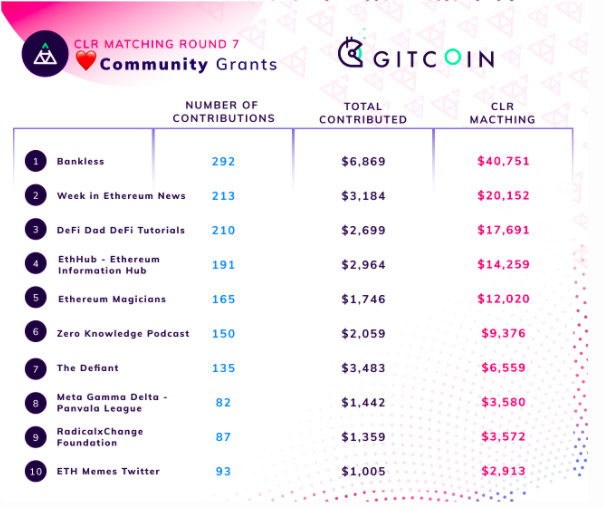
Defi project join match
In this round, we were able to obtain a higher matching value than before. This is because, for the first time, the regular matching provided by the Ethereum Foundation and some community members has been highly involved in various Defi projects:

The match is:
Chainlink -smart contract oracle project
Optimism -a layer-2 optimistic rollup
Balancer -a decentralized exchange
Synthetix -integrated asset platform
Yearn -Mortgage Loan Platform
Three Arrows Capital -Investment Fund
Defiance Capital -Investment Fund
Future Fund -non-investment funds
$ MEME —— Meme coin
Yam- Defi project
Some personal matchers: ferretpatrol, bantg , Mariano Conti , Robert Leshner , Eric Conner , 10b576da0 .
These participants have jointly provided a large amount of matching funds, part of which has been used in this round of financing, and the other part is reserved as a "rainy day fund" (that is, when the economy is good, a fund is used for economic panic). There are fewer future matches.
This is an important milestone for the ecosystem because it shows that Gitcoin Grants has got rid of its dependence on very few donors and is moving in a more sustainable direction. But what is worth exploring is what motivates these matchers to make a contribution. Is this sustainable development?
The following possible motives are explained to varying degrees:
1. People are born altruists to some extent. This round of Defi projects gained unexpected wealth for the first time due to the rapid rise in interest and token prices. Therefore, donating some windfalls is like The natural "good things do well".
2. By default, many people in the community are critical of the Defi project and regard it as an unproductive "casino". These "casinos" have brought a negative image to Ethereum. Therefore, contributing to public welfare is an easy way for the Defi project to show that they want to become active contributors in the ecosystem.
3. Even without such negative opinions, Defi is still a highly competitive market that relies heavily on community support and network effects. Therefore, for a project, winning friends in the ecosystem is very valuable.
4. The largest Defi projects can get enough benefits from these public welfare undertakings, which is beneficial to them.
5. There is a highly similar common ownership between Defi projects (a token holder also holds other tokens and holds ETH). Therefore, even if the donation of a large amount of funds is not entirely in the interests of the project, the project’s behalf Coin holders will also promote the project to contribute, because as holders, they can not only benefit from the benefits of the project, but also from other projects in which they hold tokens.
Of course, the remaining question is: How sustainable are these incentives? Are the incentives of altruism and public relations sufficient to facilitate a one-off donation of this scale, or can it become more sustainable? Can we expect that there will be US$2 million to US$3 million each year for secondary financing matching? If so, this is good news for the diversification and democratization of public welfare undertakings in the Ethereum ecosystem.
Where are the troublemakers?
A strange result appeared in both the previous round and this round: the previous rounds of "controversial" community funders seem to be highlighting themselves that have fallen. In theory, we should see them continue to gain support from their supporters, while detractors can do nothing about it. However, in fact, the most popular media recipient in this round seems to be the relatively uncontroversial and widely popular mainstream in the Ethereum ecosystem- "Zero Knowledge Podcast" , an excellent podcast program, they are targeting A relatively small audience with a higher technical content, but also received a lot of donations in this round.
what happened? Why does the quality of the media recipient's distribution depend on themselves? Could this mechanism be more self-correcting than we thought?
Overpayment
This is the first round, and the top recipients of all parties have received a considerable amount of donations. In terms of infrastructure, the White Hat Hacking project (basically a fund donated to samczsun ) received a total of US$39,258, while Bankless Podcast received US$47,620. We can ask a question: Does the largest recipient receive too much money?
To be clear, I do think that it is very inappropriate to try to establish a code of ethics, which stipulates that contributors to public welfare can only get a certain level of salary, and cannot get a much higher salary. Those who issue tokens can always make a lot of money; for public welfare contributors, this possibility is completely natural and fair (in addition, the cost of this round is converted to about 200,000 US dollars per year, even less than so much).
However, we can ask a more limited and practical question: Given the current return structure, give the extra $1 to a top contributor instead of another very valuable project with insufficient funding? Turbogeth, Nethermind, RadialXChange, like many other projects, are still doing many things with meager funds. For the first time in history, the matching amount is high enough that this is actually a major issue.
Especially if matching funds are further increased, will the ecosystem be able to allocate funds correctly to avoid excessive project funds? Or, if it can’t avoid over-concentration of funds, is it all bad? Perhaps becoming the center of a new round of attention and the possibility of getting a windfall of $500,000 will be one of the motivating factors for independent charity donors!
We don't know, but this is an unknown fact. It is the first time to reveal the fact of experimenting on a new scale.
Let's talk about classification...
The concept of categories currently implemented in Gitcoin Grants is a bit strange. Each category has a fixed total matching amount, which is distributed among the items in that category. The basic meaning of this mechanism is that the community can be trusted to choose between projects in the categories, but we need a separate technical expert judgment to determine how funds are first allocated between different categories.
However, it becomes more contradictory. In the seventh round, the "Collection" function was introduced in the middle of the process:
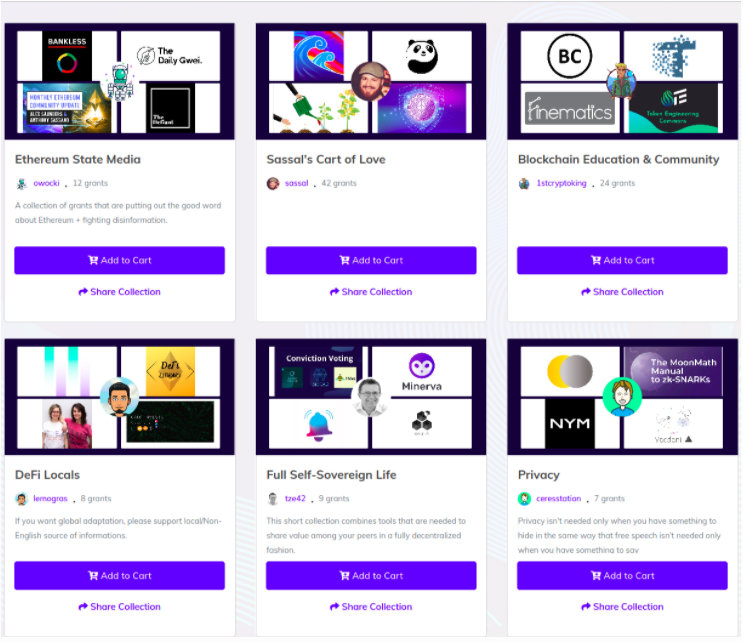
If you click "Add to Cart" on the collection, all the content in the collection will be added to the shopping cart immediately. This is weird, because this mechanism seems to send the exact opposite message: users who don’t know the details can choose to allocate funds to the entire category, but (unless they manually edit the amount) they cannot take the initiative in each category decision.
Which one is it? Do we believe that it can be distributed between categories, but it prevents people from making detailed decisions within the categories, or do nothing else at all? I suggest that in the eighth round, we should think more deeply about the philosophical issues here and propose a more principled approach.
One option is to have a matching pool and make all categories a voluntary UI layer. Another approach is to try to use more affirmative actions to guide specific categories: for example, we can divide the "community" match into $25,000 for each major world region (e.g., North America + Oceania, Latin America, Europe, Africa) Match pools, Middle East, India, East Asia and Southeast Asia) to benefit more projects in neglected areas. There are many possibilities here! A hybrid route is that the “centralized” funding pool itself can be obtained in the previous round Second funding!
One option is to have a matching pool and make all categories a voluntary UI layer. Another approach is to try to use more “affirmative actions” to guide specific categories: for example, we can divide the community’s $25,000 matching pool into each major world region (e.g., North America + Oceania, Latin America, Europe, Africa, the Middle East, India, East Asia and Southeast Asia), trying to give a boost to projects in more neglected areas. There are many possibilities here! A hybrid route is that the "focused" matching pool itself can get a second funding in the previous round!
Authentication
With the increase in collusion, forged accounts and other attacks on Gitcoin Grants, an additional verification option was added in the seventh round, namely the decentralized BrightID based on social graph]( https://www.brightid.org/), And the user base of the project has been increased by 10 times :
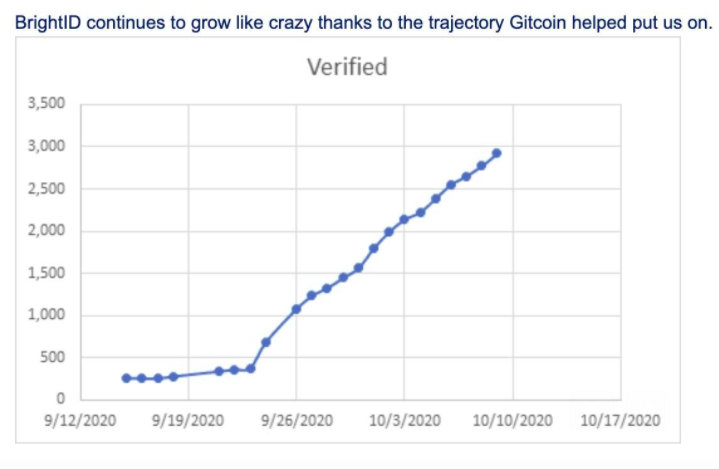
This is a good thing, because while helping BrightID users grow, this project is also facing an experimental test: now there are many people on the market trying to create fake accounts on it! BrightID will face a daunting challenge-allowing ordinary users to join easily and easily, but at the same time resisting attacks from fake and duplicate accounts. I look forward to seeing them work hard to meet the challenge!
Scalability of ZK rollups
Finally, round 7 is the first round of Gitcoin Grants trying to use ZkSync ZK aggregation to reduce payment fees:
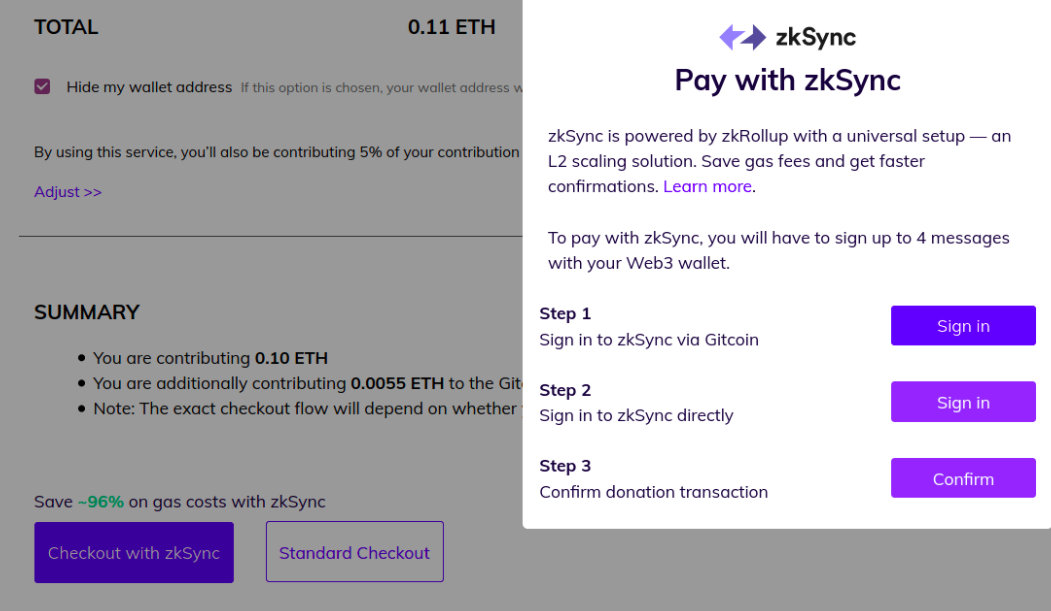
The main thing to report here is very simple. ZK rollup has successfully reduced costs! The user experience is working well. Many ZK rollup projects are seeking direct cooperation with collaborating with wallets , which will further improve the availability and security of such technologies.
in conclusion
The seventh round is a crucial round for Gitcoin Grants. Matching funding has become more sustainable. The current level of funding is sufficient to successfully fund secondary freelancers, so that a project gets "too much funding" is a thing to worry about! Identity verification is moving forward. With the launch of ZkSync ZK rollup, payment becomes more efficient. Looking forward to seeing more rounds of funding continue in the future.
About ChinaDeFi
ChinaDeFi - ChinaDeFi.com DeFi is a research-driven innovation organization , from the day in more than 500 high-quality Ge sources close to the 900 content , look for thinking more depth, more systematic combing content to be synchronized to the fastest speed The Chinese market provides decision-making aids.